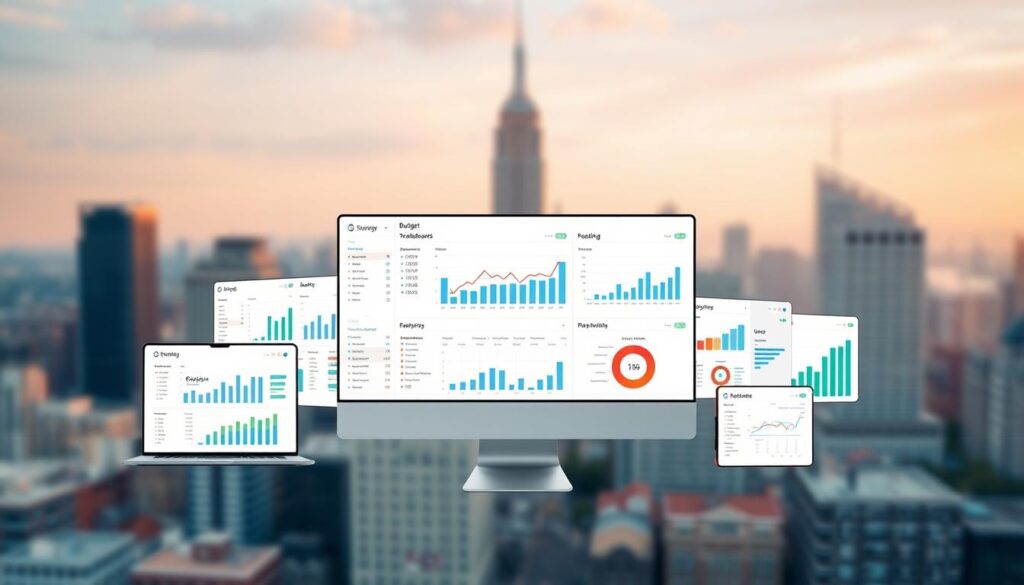Ever wondered why some businesses do well while others struggle? It often comes down to their financial reporting and budgeting. Today, more businesses see the value in Financial Reporting and Budgeting Integration Tools. They need integrated financial reporting solutions more than ever.
We’ll look at how these tools can make your finance work better. They can make things run smoother and your financial data more accurate. For finance leaders, using budgeting software tools is key to making smart choices that grow their business.
Let’s explore the benefits, top tools, and best practices for these integration solutions. Your journey to better financial control begins now!
Table of Contents
Key Takeaways
- Integration tools enhance financial management by minimising the risk of errors.
- Automation speeds up the financial reporting process for timely insights.
- Cloud-based solutions provide scalability to accommodate business growth.
- Real-time data analysis enables informed decision-making and strategic planning.
- Selecting the right software is critical for meeting your business needs.
- Training and support are vital for a successful implementation.
Understanding Financial Reporting and Budgeting
Financial reporting and budgeting are key to managing a business. They help understand a company’s financial health and guide big decisions. Knowing how they work helps organisations use resources well and track their money.
What is Financial Reporting?
Financial reporting shows a company’s financial status by recording and summarising transactions. It creates important financial statements like the balance sheet and income statement. These are key for making decisions.
Companies must follow international standards like IFRS and local laws, such as the Companies Act 2006. Accurate financial reporting is vital. It depends on good integration tools to collect and check data.
Importance of Budgeting
Budgeting is like a map for using resources in a business. It helps set financial goals, predict costs, and check how well things are going. Knowing why budgeting is important helps companies prepare for future issues.
This approach helps teams work together and meet financial goals set by management.
Key Components of Integration Tools
Integration tools are essential for financial reporting and budgeting. They bring together data from different places, cutting down on manual work and mistakes. By automating reports, businesses can make their financial reports more efficient and accurate.
These tools have easy-to-use interfaces and ensure rules are followed. For more on cash flow statements, see this guide.
Benefits of Integration Tools for Businesses
Using integration tools can greatly help businesses, mainly in financial areas. They make work flow better, simplify processes, and help make better decisions. With these tools, companies can do their main work without getting bogged down by financial tasks.
Improved Efficiency and Accuracy
Integration tools can make a big difference in how efficiently things get done. For example, automating data entry can cut down on mistakes by up to 90%. Finance teams spend a lot of time on the same tasks over and over.
With integration tools, they can focus on more important tasks. Studies show that 64% of big companies see better results from using these tools.
Enhanced Decision-Making
Integration tools give businesses real-time financial updates. This helps them make better decisions faster. Companies using budgeting software see a 25% boost in making informed decisions.
This is because they can quickly get to the financial data they need. They can plan better and use resources more wisely. Businesses that set financial goals with budgeting tools are 50% more likely to hit their revenue targets.
Streamlined Workflow Processes
Integration tools make it easier for different departments to work together. They keep important financial data in sync, often every day. This helps teams work better together and speeds up financial reporting.
Companies using these tools see a 35% boost in how well things get done. This shows how important integration tools are for running a business smoothly.
Popular Financial Reporting Tools
Many financial reporting tools are popular across different industries. They meet various business needs, ensuring accurate financial reports. Let’s look at some top picks, each with unique features.
QuickBooks
QuickBooks is loved for its easy-to-use interface. It’s a hit with small and medium-sized businesses. It helps companies make real-time financial reports and improve their financial management.
QuickBooks Online starts at £10.50 a month for the first three months. Then, it’s £35 a month. This makes it easy for businesses to keep track of their finances and make smart choices.
Microsoft Excel
Microsoft Excel is a top pick for finance experts. It’s known for its flexibility and being easy to use. Many use it for detailed financial analysis and calculations.
Excel lets users create reports that fit their needs. It’s a favourite for making custom financial reports.
Adaptive Insights
Adaptive Insights is great for financial planning and analysis. It’s perfect for those who want to improve forecasting and data consolidation. Its features help users make reports that guide strategic decisions.
As businesses grow, Adaptive Insights keeps up. It ensures financial reporting stays relevant. For more on choosing the right financial tools, check out this guide.
Leading Budgeting Software Options
Businesses find a range of budgeting software options to meet their financial needs. These tools automate tasks and improve team collaboration. They offer powerful features that set them apart.
Planful
Planful is known for its advanced features. It makes budgeting and tracking easier. It also helps to combine data from different sources, giving a clear view of finances.
Using Planful can save a lot of time. Finance teams spend less time on manual tasks. This is because 60% of their time is usually wasted on repetitive tasks.
Anaplan
Anaplan is a top choice for budget management. It’s flexible and supports team budgeting. It also offers deep analytics for strategic planning.
Oracle Budgeting Cloud Service
Oracle Budgeting Cloud Service combines analytics with budget control. It helps manage budgets better by centralising data. It’s fast to set up, unlike some competitors.
It supports various budgeting frameworks. This makes it suitable for different business needs.
Regular budget reviews are key to getting the most from these tools. They help teams make informed decisions based on data.
Key Features to Look for in Integration Tools
Choosing the right integration tools is key to boosting efficiency and results. We look for features like automation, real-time data analysis, and easy-to-use interfaces. These help streamline work and improve business performance.
Automation Capabilities
Automation in reporting tools cuts down on manual work. It reduces errors and boosts accuracy in financial reports. This lets teams spend more time on strategic analysis, not just data entry.
Real-Time Data Analysis
Real-time data analysis gives quick insights for better decision-making. It lets teams respond fast to market changes and adjust strategies. This speeds up decision-making and improves performance.
User-Friendly Interfaces
A simple interface is vital for easy use by team members. It makes collaboration smoother and reduces the time to learn new tools. As more businesses need tools for non-technical staff, ease of use is more important than ever.
Choosing the Right Tool for Your Business
When picking financial tools for your company, think about a few important things. It’s key to find the right fit for your business size, industry needs, and budget. This choice can greatly affect how well you integrate these tools into your work.
Consider Your Business Size
The size of your business matters a lot when choosing financial tools. Small companies usually go for easy, affordable options. These tools are simple to use and don’t cost a lot. But, big companies need more advanced systems to handle their complex finances.
It’s important to pick tools that match your company’s size and needs. This ensures they can handle what your business does best.
Evaluate Your Industry Needs
Every industry has its own rules and standards for financial reports. It’s smart to look for tools that meet these specific needs. This way, you can follow the rules and make better financial decisions.
Choosing the right tools for your industry can make your financial management better. It helps you make informed choices and work more efficiently.
Budget Constraints to Keep in Mind
Money matters a lot when picking financial tools. You need to find tools that fit your budget but also do the job well. It’s important to think about the total cost, including what you pay upfront and what you’ll pay later.
By carefully looking at these costs, you can find tools that are affordable. This way, you can meet your financial needs without spending too much.
Best Practices for Implementing Integration Tools
Getting integration tools to work well needs a few key steps. First, we focus on training for reporting tools to help our teams use them well. Knowing what we want to achieve helps us set clear goals. Regular checks on how well these tools work are also vital to see if they’re really helping.
Training Your Team
A team that knows how to use integration tools is essential. Good training makes users more confident and accurate. Studies show that training can cut down on mistakes and boost efficiency.
Setting Clear Objectives
Having clear goals is key to success with integration tools. It helps us see how well the tools are doing. Without clear goals, it’s hard to know if the tools are helping the business.
Regularly Reviewing Performance
Checking how well integration tools are working regularly is important. By looking at things like accuracy and speed, we can make smart changes. This keeps our financial data safe and helps us make better decisions.
Overcoming Common Challenges in Integration
Integrating new financial tools can be tough. It often comes with many challenges that need careful planning. Knowing these challenges helps businesses avoid problems and ensure a smooth setup.
Data Migration Issues
One big challenge is data migration. Many struggle to move data from old systems to new ones. A lot of businesses find keeping data accurate a major hurdle.
Bad data can lead to wrong decisions. It’s key to have good data management to keep data clean during the move.
Alignment with Existing Systems
Integrating new tools with old systems can be tricky. It can mess up workflows and make things less efficient. Many organisations face problems when new accounting tech is added.
It’s important for systems to work together smoothly. This ensures everyone has the right information to make good choices. Working with IT experts can help a lot.
User Adoption Barriers
Getting people to use new tools can be hard. Employees might not want to change their ways. Telling them why the new tools are good and supporting them can help.
Training is key. Businesses should teach their teams how to use the new tools well. This helps everyone learn and grow together.
Improving financial reporting and budgeting is important. Overcoming challenges is key to better financial practices. For better management, keeping an eye on important numbers is vital, as shown in this resource.
Future Trends in Financial Reporting and Budgeting Tools
The world of financial reporting and budgeting is about to get a lot more exciting. Businesses are looking for new ways to improve, and several trends are leading the way. These include the use of artificial intelligence, the benefits of cloud integration, and a focus on keeping data safe.
These changes will make things more efficient, accurate, and better for the financial health of companies.
Artificial Intelligence Enhancements
AI is changing the game for CFOs and finance teams. With AI, they can get insights from big data, helping them make better decisions. It also cuts down on manual work and mistakes.
More than 80% of CFOs plan to spend more time learning about new tech. This shows how important AI is becoming.
Increased Cloud Integration
Cloud integration is making finance work more flexible and accessible. It’s becoming more popular as companies see its benefits. Cloud solutions help teams work together, even when they’re not in the same place.
More companies are using integrated financial platforms. This lets them analyze data in real-time, making budgeting and forecasting easier.
Focus on Data Security
Data security is more important than ever in today’s digital world. New security features make sure only the right people can see financial information. This is key because of the growing number of cyber threats.
Companies are also focusing on sustainable practices in their financial processes. This includes adding ESG factors to their reports. Keeping data safe is a top priority in the financial world today.
By following these trends, companies can make better decisions and grow. If you’re thinking about outsourcing financial management, check out the benefits.
Case Studies: Successful Implementations
Looking at case studies on integration tools is very helpful for finance leaders. They show how modern solutions can change old ways of working. Let’s look at three examples of companies that made big changes in their financial systems.
Company A’s Transformation Journey
Discover Financial Services merged seven old ERP systems into one Oracle Fusion Cloud ERP system in 2019. They did it on time and on budget, even with the challenges of working from home during COVID-19. Just 15 days after starting, they got lots of positive feedback.
The new system made it easier to get financial information. This helped with managing expenses and planning better.
Insights from Company B
Hormel Foods, with over 50 brands, had old IT systems that didn’t work well together. They worked with KPMG to use Oracle Cloud ERP. This made their processes and data the same across the company.
This new system helps with financial reports for all brands. It makes things clearer and easier to keep up with.
Lessons Learned from Company C
Taylor Corporation wanted to bring together 85 different systems. They expected to save $20 to $30 million. Now, finance teams can see accounts receivable data right away, which used to take weeks.
CEO Charlie Whitaker made sure all 10,000 employees were involved. He stressed the importance of teamwork and good communication for success.
Conclusion: Streamlining Your Financial Processes
Using Financial Reporting and Budgeting Integration Tools is key in today’s business world. They make financial processes smoother. They help in making better decisions and working together more effectively.
Reports show that 85% of CFOs face challenges with many financial tools. This shows the need for tools that work together well.
Choosing the right financial reporting software is important. We need to know what our organisation needs. Knowing the options and trends helps us make good choices.
For example, 61% of people say better finance tech helps save costs. This shows how important it is to pick the right tools for smooth financial operations.
As we move forward, using these tools is vital. 73% of CFOs struggle with data quality. Investing in integration tools helps solve these problems.
It lets teams focus on important analysis instead of routine tasks. The future of finance looks bright for those who adapt!
FAQ
What are Financial Reporting and Budgeting Integration Tools?
These tools are essential for organisations. They help by linking different financial systems. This makes finance work better and data more accurate.
How do integration tools improve financial reporting?
They make reporting better by doing tasks automatically. This cuts down on mistakes. It lets finance teams focus on analysis, not just gathering data.
What popular tools are available for financial reporting?
Top tools include QuickBooks for its easy use, Microsoft Excel for its flexibility, and Adaptive Insights for detailed planning.
What are the top budgeting software options?
Leading options are Planful for managing budgets, Anaplan for teamwork, and Oracle Budgeting Cloud Service for analytics.
What key features should I consider when selecting integration tools?
Look for tools that automate tasks, analyse data in real-time, and are easy to use. These features boost efficiency and accuracy.
How can I choose the right tool for my business?
Think about your business size, industry needs, and budget. Choose a tool that fits your financial situation and reporting needs.
What best practices should I follow for implementing integration tools?
Train your team on the new tech, set clear goals, and check progress often. This ensures a smooth transition.
What common challenges might arise during integration?
You might face issues like moving data, fitting the new system with your current setup, and getting users to adopt it. Good communication and support can help.
What future trends should I be aware of in financial reporting and budgeting tools?
Watch for more AI for analytics, cloud integration for flexibility, and better data security to fight cyber threats.
Can you share any successful case studies related to these tools?
Yes! Company A used real-time analytics for better decisions. Company B improved teamwork with budgeting software. Company C showed the value of training and change management.







